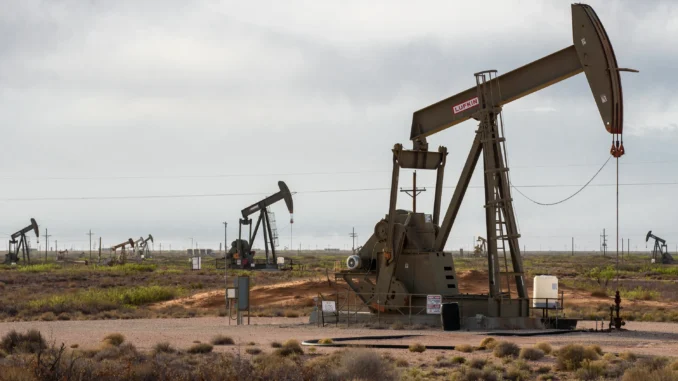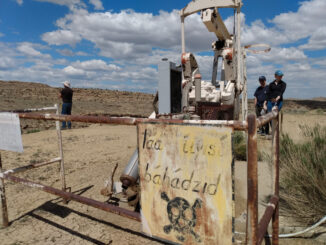
A sale of New Mexico’s public land to the oil and gas industry was expected in May with lands going to auction throughout the Permian Basin in the southeast corner of the state.
The auction scheduled May 25 was to include 45 parcels of land in Eddy, Lea and Chaves counties, along with Cheyenne County, Kansas, according to the federal Bureau of Land Management which is holding the sale.
Eddy County led New Mexico in acreage at 1,923 acres on eight parcels, followed by Lea County with 955 acres on nine parcels and 400 acres in Chaves County on two parcels.
About 5,702 acres of public land in Cheyenne County, Kansas was also offered in the sale on 24 parcels, records show.
The BLM reported March 17 that it found oil and gas extraction on the nominated parcels of land would not significantly impact the environment.
The lands were expected to see 19 horizontal wells drilled, producing about 3.2 million barrels of oil and 18 billion cubic feet of natural gas, read the BLM’s report.
Oil and gas operations were already ongoing in the area, the report noted, within the nation-leading Permian Basin region that spans southeast New Mexico and West Texas.
“Within these counties, as well as the area immediately surrounding the nominated lease parcels, there already exists extensive oil and gas development and production,” read the report. “Oil and gas development and its attendant industry are identifying components of the economic and social fabric of the region.”
For those still concerned for the impacts, a protest period was opened Friday until April 17.
Lawsuit seeks to end oil and gas leasing in U.S.
An environmental group sought to voice its opposition to leasing public land to oil and gas in court, leading a national lawsuit against the BLM’s parent agency the U.S. Department of the Interior.
Santa Fe-based WildEarth Guardians were lead plaintiffs in the suit filed Thursday, along with national groups the Center for Biological Diversity and Friends of the Earth.
The notice of intent to sue was signed by 360 environmental and indigenous groups around the country, citing the DOI’s alleged failure to phase out oil and gas operations on public land.
The suit followed a petition the groups sent to the DOI in January 2022, calling for the agency to ratchet federal oil and gas production down to “near zero” by 2035 to avoid global warming of 1.5 degrees Celsius – a benchmark set by the international community to avoid extreme weather conditions.
Along with WildEarth Guardians, New Mexico Climate Justice, New Mexico Environmental Law Center and New Energy Economy signed on to the lawsuit.
“Allowing continued, unchecked extraction of fossil fuels would all but make it impossible to avoid disastrous climate change and to keep global temperature increases well below 1.5°C of warming,” read the suit.
“We have reached the point that unabated fossil fuel production now presents a clear and present danger to the climate, natural habitats and wildlife across the United States, and is unjustly burdening impacted communities everywhere.”
Jeremy Nichols, climate and energy program director at WildEarth Guardians said President Joe Biden has so far failed to deliver on promises made during the campaign trail and first term in office to reduce pollution from domestic energy production.
“Far from living up to his promise to protect the climate, President Biden is actually undermining his commitment to the American public to end fossil fuel leasing,” Nichols said.
“We can’t frack our way to a safe climate and this lawsuit aims to ensure President Biden’s administration heeds the reality that we need to transition the United States away from both the consumption and production of oil and gas.”
A nationwide ban on federal oil and gas leasing would cut 280 million tons of carbon emissions per year, according to a 2018 study from the Stockholm Environment Institute in Seattle cited in the lawsuit.
“Avoiding dangerous climate change will require a rapid transition away from fossil fuels. By some estimates, global consumption and production of fossil fuels—particularly coal and oil—will need to end almost entirely within 50 years,” the study read.
“Given the scale of such a transition, nations may need to consider policies that constrain growth in fossil fuel supplies in addition to those that reduce demand.”
But industry leaders argue the federal government was required to continue leasing land for extraction under the Mineral Leasing Act.
Aaron Johnson, vice president of public and legislative affairs said in an email that means the BLM must lease lands in any state where there is interest from the industry, including New Mexico.
“The Mineral Leasing Act requires that BLM offer oil and natural gas leases in every state where there’s interest expressed by companies,” he wrote. “That certainly applies to New Mexico.”
Johnson also pointed to the recently passed Inflation Reduction Act that requires the BLM to hold oil and gas lease auctions as a condition of offering permits for renewable energy projects.
“While the agency has some discretion in terms of how many leases are offered and where they are offered within the state, that discretion does not mean they can simply not offer leases,” he said.
“Contrary to what environmental groups wish, the agency’s limited discretion doesn’t mean it can ignore the law.”



